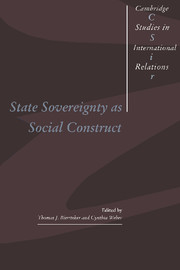Book contents
- Frontmatter
- Contents
- List of figures
- List of contributors
- Acknowledgments
- 1 The social construction of state sovereignty
- 2 Contested sovereignty: the social construction of colonial imperialism
- 3 Beyond the sovereignty dilemma: quasi-states as social construct
- 4 The sovereign state system as political-territorial ideal: historical and contemporary considerations
- 5 Sovereignty and the nation: constructing the boundaries of national identity
- 6 Sovereignty, nationalism, and regional order in the Arab states system
- 7 Binding sovereigns: authorities, structures, and geopolitics in Philadelphian systems
- 8 Hierarchy under anarchy: informal empire and the East German state
- 9 Reconstructing the analysis of sovereignty: concluding reflections and directions for future research
- Index
- Titles in the series
8 - Hierarchy under anarchy: informal empire and the East German state
Published online by Cambridge University Press: 01 June 2011
- Frontmatter
- Contents
- List of figures
- List of contributors
- Acknowledgments
- 1 The social construction of state sovereignty
- 2 Contested sovereignty: the social construction of colonial imperialism
- 3 Beyond the sovereignty dilemma: quasi-states as social construct
- 4 The sovereign state system as political-territorial ideal: historical and contemporary considerations
- 5 Sovereignty and the nation: constructing the boundaries of national identity
- 6 Sovereignty, nationalism, and regional order in the Arab states system
- 7 Binding sovereigns: authorities, structures, and geopolitics in Philadelphian systems
- 8 Hierarchy under anarchy: informal empire and the East German state
- 9 Reconstructing the analysis of sovereignty: concluding reflections and directions for future research
- Index
- Titles in the series
Summary
States have sovereignty to the extent that they have exclusive authority over their territories. In the modern states system this authority is usually differentiated into internal and external sovereignty. This means that states have the ultimate authority within domestic society to make decisions even if the decisions are significantly constrained in practice by other domestic actors, and that states have the authority within international society to do as they please even if their actions are significantly constrained in practice by other states. To say that states are sovereign, in other words, is to say that they have certain rights, even if the exercise of those rights is constrained. Rights are not intrinsic, naturally given attributes, like the height or weight of an individual; they are conferred upon actors through a process of social recognition that constitutes particular kinds of identities. Rights are socially constructed. In the absence of recognition, a state might be able to achieve exclusive control by sheer force, but this is a very different and typically a more difficult matter than exercising rights. The recognition that constitutes states as sovereign comes from domestic and international society, both of which give permission to states to rule a particular space. In this chapter, we are interested primarily in the role of international society in this process.
We focus on external recognition because we are interested in situations in which state sovereignty coexists in relation to super-ordination, subordination, or hierarchy among states.
- Type
- Chapter
- Information
- State Sovereignty as Social Construct , pp. 240 - 277Publisher: Cambridge University PressPrint publication year: 1996
- 7
- Cited by

